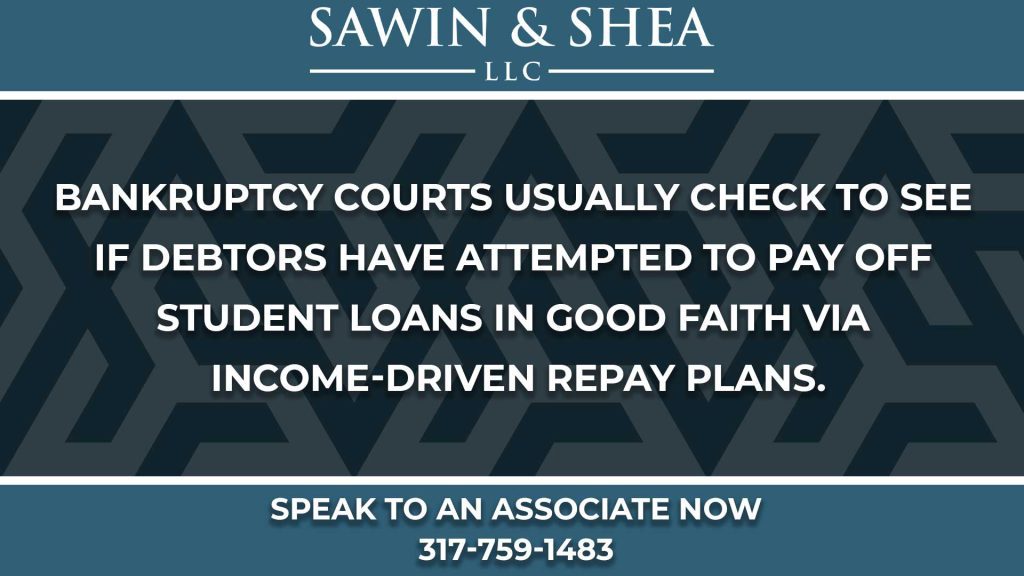The Importance of Hiring Loan Bankruptcy Lawyers

Getting a college education is an important milestone for countless Americans. Many careers require collegiate degrees, and graduates should be proud of obtaining their diplomas.
Still, the sad reality is that numerous individuals struggle with cumbersome student debt long after graduation. Overwhelming student loan debt has become a crippling reality for millions of Americans, and some will struggle with this burden throughout their entire lives. Forbes reported that 7% of Americans who obtained student loans will never fully repay their loans based on their current debt payment trajectories.
In addition to this staggering figure, there are an estimated 44 million borrowers who have student debts, and the combined student loan debt in the United States is $1.5 trillion. Further, around 10.7% of borrowers are currently in default or have been in delinquency for over 90 days.
Those with student debts often contribute a significant portion of their earnings to satisfy monthly payments, and many suffer from undue hardship as a direct result.
If you’re struggling with student loan debt, you have options. Whether you’re currently in default or are struggling to make ends meet, a student loan bankruptcy lawyer can help.
Here at Sawin & Shea, our bankruptcy attorneys have years of experience helping those with exorbitant debts. We can help you with your student loan debt by guiding you through the bankruptcy process. Unfortunately, it’s difficult to discharge student loans. With an experienced bankruptcy lawyer, you can rest assured that your legal counsel will explain your options.
You can schedule a free consultation with an Indiana student loan bankruptcy lawyer online or by calling (317) 759-1483.
Can Student Loan Debt Be Discharged With Bankruptcy?

Historically, having a student loan be fully discharged in bankruptcy was incredibly challenging. The U.S. government has recently changed part of the process of discharging student loans to make it somewhat easier, but unloading these loans remains difficult, and it’s especially hard if you go through the process without an attorney.
To have your student loans discharged, you’ll need to apply through the United States Department of Education. Before applying through the Department of Education, you’ll have to file an adversary proceeding in bankruptcy court. You technically don’t need an attorney for this process, but an experienced bankruptcy lawyer will help with filing everything correctly. They will also help you prove that you qualify to have your student debt discharged.
Qualifications To Discharge Student Loans
Those wanting to discharge student debt must meet a legal standard known as the Brunner test. The Brunner test refers to three factors that you must prove in bankruptcy court to be eligible for filing for a discharge.
The first factor students must prove is that they suffer undue hardship as a direct result of their student loans. Undue hardship in this context means that your student loan payments make it impossible for you to maintain a minimal standard of living, such as having sufficient food, housing, clothing, and other necessities.
If the financial burdens caused by your loans keep you from sufficiently supporting yourself or your dependents, you may qualify for a student loan discharge or deferment. You must have sufficient proof that you cannot pay the money for your monthly payment and still maintain a minimal standard of living for yourself and your dependents.

Another factor students must establish is that their undue hardship will continue during the entirety of their student loan debt repayment period. You must show that the undue hardship is not just temporary. Instead, your financial circumstances and income will remain the same throughout your repayment period, meaning you’ll continue not being able to live with minimal standards.
Finally, you must demonstrate that you made good faith efforts to pay off your student debt. Individuals frequently fail to discharge their student debt because of this final factor. Bankruptcy courts usually check to see if debtors have attempted to pay off student loans in good faith via income-driven repay plans. If you haven’t attempted to modify your loan, the bankruptcy court may deny your discharge or deferment, even if you suffer undue hardship and reduced income in the future.
What If My Federal Student Loans Can’t Be Discharged?

While discharging debt has become easier in recent years, numerous individuals still face rejection. Fortunately, you have other options as well. Your bankruptcy attorney will help you navigate your options amidst your financial circumstances. Bankruptcy is a great option for many struggling with both student loans and other debts. Although bankruptcy doesn’t guarantee that you’ll be able to discharge your student loans, filing can still help you with making payments.
By filing Chapter 7 or Chapter 13, you can discharge your unsecured debts, such as credit card balances and medical debt with a consolidation of your debt. That way, you can alleviate the pressure caused by other financial stressors. You can then use that money to pay off your student loans faster while improving your financial circumstances.
Additionally, you can explore options to have your student loans forgiven. For example, those working for nonprofit organizations or the U.S. government can obtain Public Service Loan Forgiveness (PSLF). To qualify for loan forgiveness, you must pay the equivalent of 10 years of student loan monthly payments while working your PSLF-qualified job.
Student Loan Modifications and Reaffirmations

Those who are unable to absolve their student loans may be able to modify their existing loans. When you modify a student loan, you can secure a lower interest rate or extend the duration of your loan to decrease your monthly payments.
You can apply to enter a new repayment plan if you have federal student loans. Many of these plans are based on borrowers’ incomes, so you can find a plan that will enable you to pay off your loan without enduring financial hardship.
These payment plans only apply to those who have federal loans rather than private loans. Fortunately, you may still have options even if you obtained a loan through a private student loan servicer. A seasoned bankruptcy attorney can negotiate with private lenders to secure you a more favorable repayment plan.
In addition to student loan modifications, you can reaffirm your current student loan through a reaffirmation agreement. This agreement reiterates your commitment to repaying your student loan debt as you enter the bankruptcy process. It serves as a legally binding promise that you’ll continue to repay your student loan. That way, you can remain in good standing with your lender.
Student Loan Rehabilitation
If your student loan is already in default and you’re not eligible for discharge, you’ll likely need to rehabilitate your loan. Defaulting on loan debt is serious, as it can lead to wage garnishment, damage to your credit score, and even legal action.
To rehabilitate your loan, you’ll need to make nine on-time monthly payments over ten months. Fortunately, these student loan payments will be based on your disposable income, and you’re allowed to miss one payment.
Once you complete your ten-month rehabilitation period, you can explore favorable repayment plan options.
Contact Sawin & Shea Bankruptcy Lawyers
If you’re struggling with student debt or living with a student loan issue, we highly encourage you to reach out to a bankruptcy lawyer. Our attorneys can help clients understand their options for becoming debt-free, and they can also help them deal with aggressive debt collectors. Here at Sawin & Shea, we know that student loan debt can become an overwhelming challenge that impacts every facet of the lives of our clients.
Don’t hesitate to contact our firm today for a free consultation and advice to protect your future. Schedule your appointment online or by calling (317) 759-1483.


